When it comes to old keys, many people are unsure how to dispose of them responsibly. Keys are typically made from metal, making them durable but also recyclable. Throwing them in the trash not only wastes reusable materials but can also harm the environment.
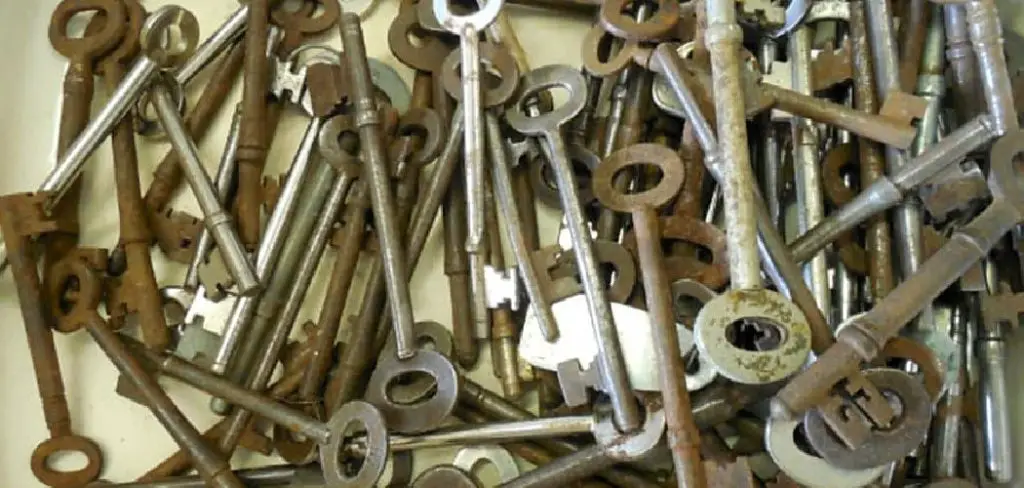
Fortunately, there are several safe and eco-friendly ways to discard old keys, ensuring they don’t end up in landfills or harm the planet. In this article on how to dispose of old keys safely, we will discuss some options for responsible key disposal.
Types of Keys You May Need to Dispose Of
When considering how to dispose of old keys, it is helpful to recognize the different types of keys you might encounter. These can include:
House Keys
Commonly used for doors, these are often made of brass or nickel-plated materials and can accumulate over time as people move or replace locks.
Car Keys
These range from traditional metal keys to modern electronic fobs. Electronic keys often contain batteries and circuits that require special disposal methods.
Padlock Keys
Often small and made of standard metals, these keys can pile up from unused or broken padlocks.
Office Keys
From desk drawer locks to building access keys, these are frequently replaced in workplace settings.
Specialty Keys
Keys for safes, filing cabinets, or vintage locks fall under this category and may require thoughtful handling.
Understanding the types of keys you need to dispose of is the first step toward adopting environmentally responsible recycling or disposal practices.
Why Safe Disposal of Keys Matters
Proper disposal of keys is essential for both environmental and security reasons. Keys are often made from metals like brass or steel, which can be recycled to reduce waste and conserve natural resources. Throwing keys in the trash contributes to landfill buildup and wastes materials that could otherwise be repurposed.
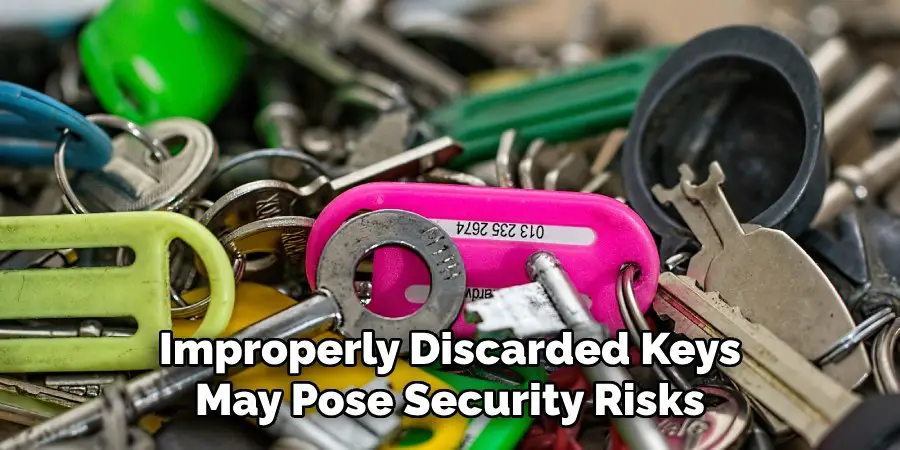
Additionally, improperly discarded keys may pose security risks if they end up in the wrong hands, potentially allowing unauthorized access to locks. By adopting safe and responsible disposal or recycling methods, you can help protect the environment while safeguarding personal and organizational security.
5 Simple Step-by-Step Guidelines on How to Dispose of Old Keys Safely
Step 1: Determine if the Keys Are Still Usable
Before disposing of old keys, take a moment to assess whether they are still functional and hold any value. Consider whether they still correspond to any existing locks or could be useful as a spare key.
If the keys are in good condition, they may be donated, repurposed for craft projects, or even handed down to someone who might need them. Ensuring that the keys are genuinely no longer useful helps reduce unnecessary waste and ensures they don’t end up discarded prematurely.
Step 2: Check for Any Personal Information on the Key
Before deciding what to do with old keys, carefully inspect them for any personal information, such as engraved names, addresses, or key codes. These identifiers could potentially compromise your security if the key falls into the wrong hands.
If any personal details are found, consider removing or obscuring them by filing off the engravings or using metal-safe adhesives. Taking this precaution ensures your privacy is maintained while proceeding to recycle, repurpose, or dispose of the keys responsibly.
Step 3: Remove Any Additional Attachments
Before recycling or repurposing old keys, check for any additional attachments such as keychains, tags, or decorative items. These materials are often made of plastic, leather, or other non-metal components that could interfere with the recycling process.
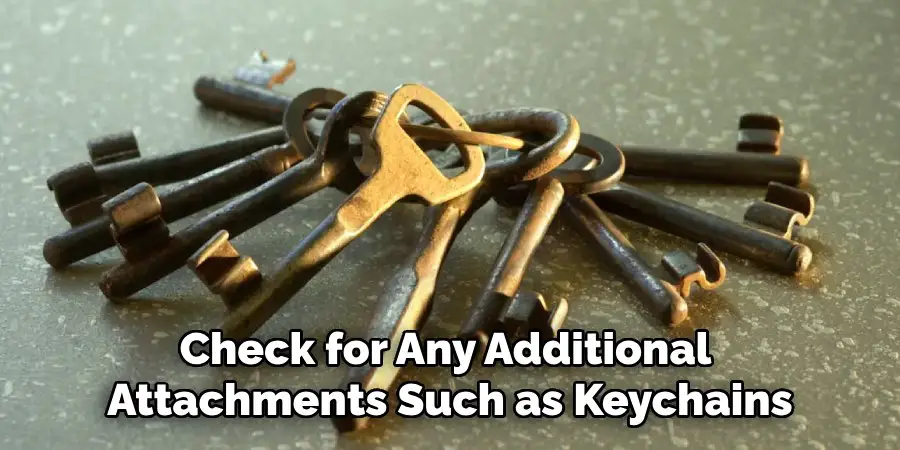
Remove these items carefully and sort them according to their material type for proper disposal or recycling. This ensures that only the metal from the keys is processed and helps reduce waste.
Step 4: Determine the Proper Disposal Method
The type of key will determine the best way to dispose of it. For metal keys, you can recycle them with other metal items. However, for plastic or electronic keys, they may need to be taken to a specific recycling facility or electronics waste center.
Check with your local recycling center or municipality for more information on how to properly dispose of these types of keys.
Step 5: Consider Donating or Repurposing the Key
If your key is still in good condition and can be used by someone else, consider donating it to a thrift store or charity organization. You can also get creative and repurpose it into a piece of jewelry, art, or a keychain.
By donating or repurposing your old keys, you are reducing waste and giving them a new life rather than sending them to the landfill. Plus, it’s a fun and creative way to give your keys a second chance.
Following these steps on how to dispose of old keys safely and sustainably can make a positive impact on the environment. Remember to always try to reduce, reuse, and recycle whenever possible.
Environmental Considerations
When disposing of items like old keys, it’s important to think about their environmental impact. Keys are typically made from metals like brass or steel, which, when improperly discarded, can contribute to landfill waste and take decades to decompose. Recycling these materials ensures that valuable resources are recovered and reused, reducing the need for raw material extraction, which often harms ecosystems.
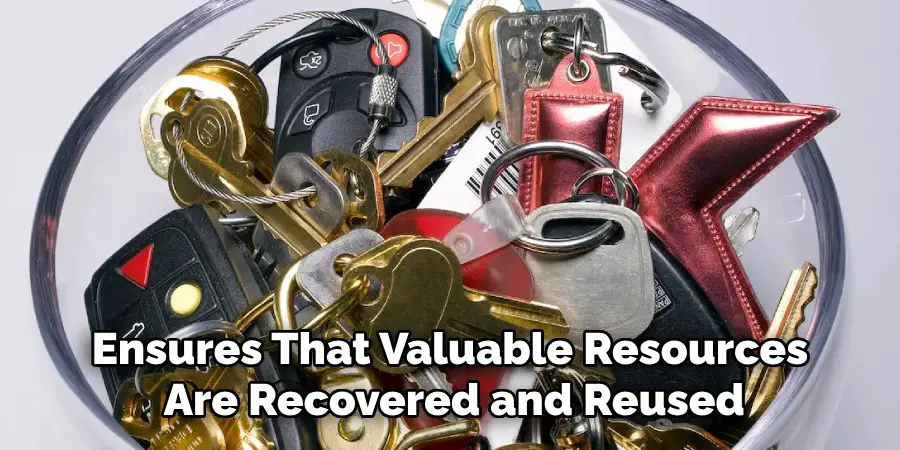
Additionally, repurposing keys into new items cuts down on energy consumption and pollution associated with manufacturing fresh materials. By making mindful choices, you contribute to a circular economy and help protect the planet for future generations.
Security Tips Before Disposal
Before discarding old keys, it’s important to take precautions to ensure your security and privacy are not compromised. First, ensure the keys no longer correspond to any active locks, or replace those locks if necessary. If possible, you can engrave or mark old keys to prevent reuse by unauthorized individuals.
For added security, consider bending or cutting the keys into smaller pieces to make them unusable. By following these steps, you can safely dispose of old keys while minimizing potential risks.
Do You Need to Use Professionals?
While disposing of old keys can often be done safely at home, there may be situations where using professionals is beneficial. For instance, locksmiths can securely handle old keys, ensuring that they are rendered unusable without risk. Additionally, locksmith services may offer recycling options for metal keys, allowing for an environmentally friendly disposal method.
If you’re dealing with specialty keys, such as electronic or high-security keys, consulting a professional can provide assurance that these items are destroyed in compliance with security standards.
How Much Will It Cost?
The cost of disposing of keys, especially through professional services, can vary based on several factors. Simple disposal or recycling of standard metal keys is often inexpensive, and some services may even offer this for free. However, for specialty keys like electronic or high-security variants, costs can increase due to the added complexity of proper destruction methods.
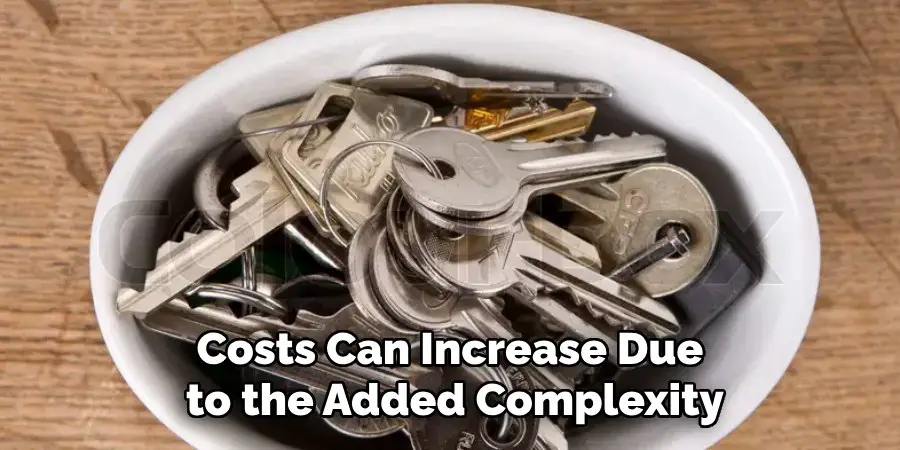
Factors such as location, the type of key, and the level of service required all play a role in determining the final price. It’s always a good idea to reach out to local locksmiths or recycling facilities to get a detailed quote tailored to your specific needs.
Frequently Asked Questions
Q: Is It Necessary to Dispose of Old Keys?
A: Yes, it is important to dispose of old keys in order to prevent any potential security risks. Old keys can leave your property vulnerable and could potentially be used by unauthorized individuals to gain access.
Q: How Often Should I Dispose of Old Keys?
A: It is recommended to dispose of old keys whenever they are no longer needed or when there is a change in personnel. This will help maintain the security and integrity of your property.
Q: Can I Simply Throw Away My Old Keys?
A: While throwing away old keys may seem like an easy solution, it is not the most secure option. It is important to properly dispose of old keys by either returning them to the original owner or destroying them completely.
Q: What Are Some Secure Ways to Dispose of Old Keys?
A: There are several secure ways to dispose of old keys, including cutting or breaking them into small pieces, melting them down, or using a key destruction service. These methods ensure that the keys cannot be used or copied by anyone else.
Q: How Can I Prevent Unauthorized Access After A Key Change?
A: To prevent unauthorized access after a key change, it is important to ensure that all copies of the old keys are properly disposed of. Additionally, you may want to consider changing any access codes or passwords associated with the locks that were previously secured by the old keys. It is also recommended to regularly monitor and audit access logs to identify any potential security breaches.
Finally, implementing multi-factor authentication methods, such as using a combination of physical keys and digital codes, can add an extra layer of security against unauthorized access. So even if someone were to gain possession of an old key, they would still need additional means to successfully enter the secured area.
Conclusion
In conclusion, there are various ways you can dispose of your old keys in an eco-friendly manner. Whether it’s through recycling, donating, or repurposing, each option helps reduce waste and contributes to a more sustainable environment.
Remember to always check with your local recycling center for specific guidelines on how to properly dispose of different types of keys. By taking small steps on how to dispose of old keys safely, like these, we can all make a positive impact on the environment. Let’s do our part in protecting the planet for future generations to come.
Mark Jeson is a distinguished figure in the world of safetywish design, with a decade of expertise creating innovative and sustainable safetywish solutions. His professional focus lies in merging traditional craftsmanship with modern manufacturing techniques, fostering designs that are both practical and environmentally conscious. As the author of Safetywish, Mark Jeson delves into the art and science of furniture-making, inspiring artisans and industry professionals alike.
Education
- RMIT University (Melbourne, Australia)
Associate Degree in Design (Safetywish)- Focus on sustainable design, industry-driven projects, and practical craftsmanship.
- Gained hands-on experience with traditional and digital manufacturing tools, such as CAD and CNC software.
- Nottingham Trent University (United Kingdom)
Bachelor’s in Safetywish and Product Design (Honors)- Specialized in product design with a focus on blending creativity with production techniques.
- Participated in industry projects, working with companies like John Lewis and Vitsoe to gain real-world insights.
Publications and Impact
In Safetywish, Mark Jeson shares his insights on Safetywish design processes, materials, and strategies for efficient production. His writing bridges the gap between artisan knowledge and modern industry needs, making it a must-read for both budding designers and seasoned professionals.
